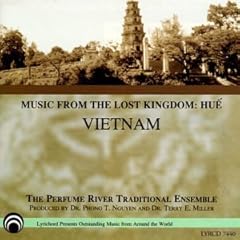 I first became interested in Vietnamese traditional music when I listened to the solo dan tranh works of ethnomusicologist and recording artist Dr. Phong Nguyen up on this website. I don't remember how I stumbled across that site, but those six songs really struck a chord in me, and for a long time I was on the lookout for any albums by the Perfume River Ensemble. Last month I found this one in the Asian section of Amoeba Music in Hollywood. The content is rather different from Nguyen's solo works I've come to love, likely because Nguyen himself doesn't actually play in this recording - he's credited as the Producer and Project Consultant. From the liner notes:
I first became interested in Vietnamese traditional music when I listened to the solo dan tranh works of ethnomusicologist and recording artist Dr. Phong Nguyen up on this website. I don't remember how I stumbled across that site, but those six songs really struck a chord in me, and for a long time I was on the lookout for any albums by the Perfume River Ensemble. Last month I found this one in the Asian section of Amoeba Music in Hollywood. The content is rather different from Nguyen's solo works I've come to love, likely because Nguyen himself doesn't actually play in this recording - he's credited as the Producer and Project Consultant. From the liner notes:Vietnam's former imperial city, Hue, lies along the beautiful Perfume River near its entry into the sea in the country's central region, an area distinguished for its strong accent, tasty cuisine, and proud cultural heritage. From 1802 until 1945 a succession of thirteen emperors of the Nguyen Dynasty ruled the country from a fortress-like Forbidden City hidden within the walled Citadel, the latter period in cooperation with their French "protectors". The court at Huế was the last in a succession of Vietnamese dynasties which preserved the rituals and music that had existed at least since the founding of the Ly dynasty in the 11th century, whose court was located in Thang Long (now Ha Noi).The songs have a very ancient and otherworldly feel to them, and at times the singing can be rather abrasive on ears not fully accustomed to this culture, mine included. The ensemble's music is also rarely as downright beautiful as the Phong Nguyen solo recordings linked to above, but it is much more varied in character, possessing many exotic idiosyncracies. To point out just one, the final track, an improvisational duet between Tran Thao's nasal double-reed ken and the clacking percussion of master drummer Manh Cam, almost sounds like Interstellar Space in early Vietnam.
The emperors required dignified instrumental music for their rituals and audiences with foreign visitors. The court's power and splendor was demonstrated in its great orchestra (nha nhac), a chorus, and a dance company. Perhaps the most spectacular ritual was the Nam Giao (Heaven and Earth Sacrifice) first celebrated on a vast outdoor esplanade built by Emperor Ly Anh Tong (1138 - 1175). A similar esplanade was built slightly to the south of Hue in 1806 for the Nguyen emperors. The sacrifice took place annually in the spring between the hours of 2 a.m. and 5 a.m. In addition the court maintained three other ensembles: a dai nhac ensemble consisting of 20 larger drums, 8 double-reed shawms, 4 large gongs, 4 small gongs, 4 conch shell trumpets, and 4 water buffalo horns, all managed by a master conductor and 14 assistance conductors; a nhac huyen group mainly consisting of sets of stone chimes and bronze bells; and a tieu nhac sting ensemble which included a lead drum and several smaller percussion instruments playing interlocking patterns.
...
The present recording resulted from the first United States tour of a Vietnamese ensemble since the end of the war in 1975. The Perfume River Traditional Ensemble, directed by Mr. Vo Que, a poet and singer, is made up of authentic artists resident in Hue. Mr. Manh Cam, aged 78, is both a survivor from the original court ensemble [of Vietnam's last emperor, Bao Dai, who abdicated in 1945] and one of the country's Artists of Merit. The ensemble toured the eastern United States for two weeks during August, 1995, performing at Lowell Folk Festival, Masschusetts, New Haven, Connecticut, at the Smithsonian Institution in Washington, D.C., and at Lincoln Center in New York City. Their repertory includes music of the court, ca hue chamber music, and folk songs of central Vietnam, specifically the Thua Thien Hue and Quan Tri provinces.
The artists sing to the accompaniment of five traditional melodic instruments and numerous percussion instruments and drums. The former include the round-bodied long-necked lute, the dan nguyet long-necked flute, the dan tranh zither with 16 strings, the dan bau monochord, the two-stringed dan nhi fiddle, and the double-reed ken shawm. The percussion instruments include both clappers and pairs of teacups struck together.
Download
Buy
No comments:
Post a Comment